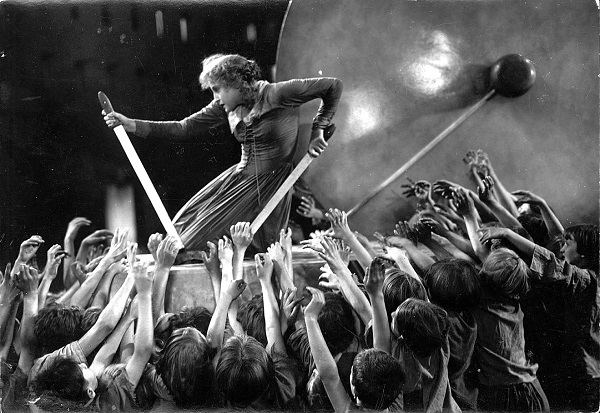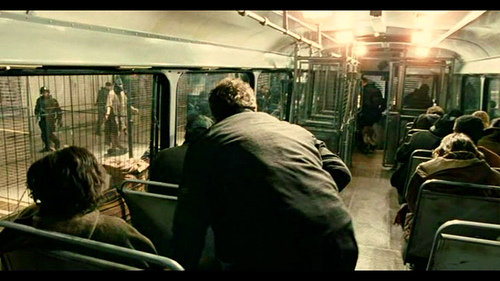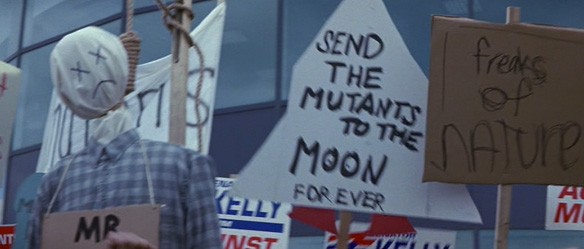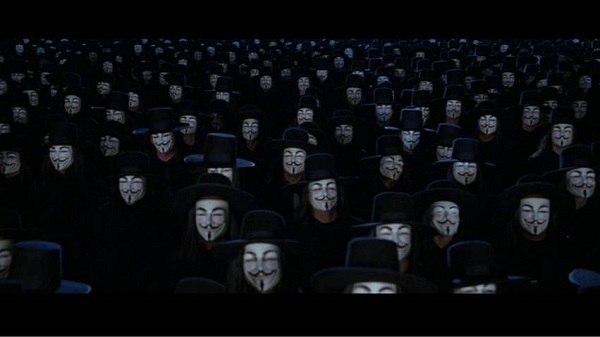Politics and Sci-Fi, a Quick Overview
Some of the best literature, movies, music, art and other culture symbols have a political message, context or subtext to them. Sci-fi is no exception and many of its great works have tackled political themes. The movie
Snowpiercer and its themes on class warfare is now out in theaters, so now is a great time to have a quick look at some key political sci-fi.
Even in the early days of the genre, there are political and moral arguments in them and texts being interpreted as such. Mary Shelley's
Frankenstein which is considered one of the earliest sci-fi novels, had the theme of man should not play God, an idea that was prevalent before and since in fiction. H.G. Wells, who wrote some of the most influential sci-fi novels, was an outspoken Socialist and some of his work has been seen in a similar context.
War of the Worlds has been interpreted as a criticism of European Colonization of Africa and
The Shape of Things to Come sets out his ideal form for society and government.

One of the great early sci-fi movies, the German silent film
Metropolis wore its political colors on its sleeve. Set in a future where society is split between the very wealthy and the working underclass, it is a movie very much about class warfare and conflict. It is also critical about the idea of open revolution and a peaceful solution as the right course of action.
Dystopia fiction is a popular form of Science Fiction to be used as voice for political issues and fears. The 1921 novel
We by Yevgeny Zamyatin, a Russian exile in Britain who was highly critical of the Russian Revolution. Aldous Huxley's
Brave New World was written as a criticism of H.G. Wells' work. George Orwell's classic novel
Nineteen-Eighty Four was written because of his hatred for Stalinism and totalitarianism and fear of nuclear war and it is a has become a cultural staple, making ideas of Big Brother and Room 101 into well known concepts.

Even modern Dystopias have brought in political themes and social commentary. Alfonso Cuarón's adaptation of
Children of Men was used as median to take British immigration policy to its extreme and criticize the conduct of the War on Terror, including a subtle background moment where a hooded man has to stand in a stress position, evoking the prisoner abuse in Abu Ghraib.
The Hunger Games Trilogy takes on issues of class inequality and reality TV with the third book also looking at war propaganda and media warfare.
The Cold War and the Atomic Age was a period that allowed for political themes. One such example is the 1951 classic
The Day The Earth Stood Still which ended with a warning against mankind's build up of nuclear weapons. Japan's
Godzilla too, was a criticism of nuclear warfare, particularly nuclear testing in the Pacific Ocean.

It's not just novels and movies that have political themes, comic books have also been used to explore political themes.
X-Men is a famous example for consistently containing political themes, starting as a metaphor for the Civil Rights Movement, then as a voice against gay discrimination and had a story arc mirroring the AIDS epidemic. Comic book characters like Captain America were used as war propaganda and the excellent series
Y: The Last Man had a lot of political commentary and satirical swipes.
Some directors are repeat offenders when making politically charged sci-fi movies. Paul Verhoeven and Neill Blomkamp are two such directors who made politically minded sci-fi. Verhoeven first Hollywood movie was
Robocop, a beloved 80s classic which was very overt in its political satire about Capitalism and Reaganism as privatisation is taken it its extremes. He turned the adaptation of the right-wing novel
Starship Troopers into a satire of fascist iconography. Blomkamp has so far only made two films and both are political sci-fi movies:
District 9 took on the themes of Apartheid and xenophobia whiles
Elysium was as subtle as a brick when looking at wealth inequality, American healthcare and immigration.

Life can imitate art and that is certainly the case with the adaptation of
V for Vendetta. The film version updated the story to be a commentary of the post-9/11 and Iraq invasion world and how a fascist government had manipulated the populous with fear as a mysterious figure lead the population of London towards a revolution. The political symbolism of V's Guy Fawkes mask has translated to real life with left wing protesters and groups like The Occupy Movement and Anonymous. Ignoring the fact that the masks are mass produced in factories and making a large company a lot of money.
This is only a snapshot about political themes in sci-fi as they are countless examples. Many academics have made their careers writing and analyzing about all this type of fiction. When Simon Pegg was at university he wrote his undergraduate thesis on seeing
Star Wars from a Marxist perspective and there is an old adage that the best sci-fi has something to say about the time during which it was made.
 One of the great early sci-fi movies, the German silent film Metropolis wore its political colors on its sleeve. Set in a future where society is split between the very wealthy and the working underclass, it is a movie very much about class warfare and conflict. It is also critical about the idea of open revolution and a peaceful solution as the right course of action.
Dystopia fiction is a popular form of Science Fiction to be used as voice for political issues and fears. The 1921 novel We by Yevgeny Zamyatin, a Russian exile in Britain who was highly critical of the Russian Revolution. Aldous Huxley's Brave New World was written as a criticism of H.G. Wells' work. George Orwell's classic novel Nineteen-Eighty Four was written because of his hatred for Stalinism and totalitarianism and fear of nuclear war and it is a has become a cultural staple, making ideas of Big Brother and Room 101 into well known concepts.
One of the great early sci-fi movies, the German silent film Metropolis wore its political colors on its sleeve. Set in a future where society is split between the very wealthy and the working underclass, it is a movie very much about class warfare and conflict. It is also critical about the idea of open revolution and a peaceful solution as the right course of action.
Dystopia fiction is a popular form of Science Fiction to be used as voice for political issues and fears. The 1921 novel We by Yevgeny Zamyatin, a Russian exile in Britain who was highly critical of the Russian Revolution. Aldous Huxley's Brave New World was written as a criticism of H.G. Wells' work. George Orwell's classic novel Nineteen-Eighty Four was written because of his hatred for Stalinism and totalitarianism and fear of nuclear war and it is a has become a cultural staple, making ideas of Big Brother and Room 101 into well known concepts.
 Even modern Dystopias have brought in political themes and social commentary. Alfonso Cuarón's adaptation of Children of Men was used as median to take British immigration policy to its extreme and criticize the conduct of the War on Terror, including a subtle background moment where a hooded man has to stand in a stress position, evoking the prisoner abuse in Abu Ghraib. The Hunger Games Trilogy takes on issues of class inequality and reality TV with the third book also looking at war propaganda and media warfare.
The Cold War and the Atomic Age was a period that allowed for political themes. One such example is the 1951 classic The Day The Earth Stood Still which ended with a warning against mankind's build up of nuclear weapons. Japan's Godzilla too, was a criticism of nuclear warfare, particularly nuclear testing in the Pacific Ocean.
Even modern Dystopias have brought in political themes and social commentary. Alfonso Cuarón's adaptation of Children of Men was used as median to take British immigration policy to its extreme and criticize the conduct of the War on Terror, including a subtle background moment where a hooded man has to stand in a stress position, evoking the prisoner abuse in Abu Ghraib. The Hunger Games Trilogy takes on issues of class inequality and reality TV with the third book also looking at war propaganda and media warfare.
The Cold War and the Atomic Age was a period that allowed for political themes. One such example is the 1951 classic The Day The Earth Stood Still which ended with a warning against mankind's build up of nuclear weapons. Japan's Godzilla too, was a criticism of nuclear warfare, particularly nuclear testing in the Pacific Ocean.
 It's not just novels and movies that have political themes, comic books have also been used to explore political themes. X-Men is a famous example for consistently containing political themes, starting as a metaphor for the Civil Rights Movement, then as a voice against gay discrimination and had a story arc mirroring the AIDS epidemic. Comic book characters like Captain America were used as war propaganda and the excellent series Y: The Last Man had a lot of political commentary and satirical swipes.
Some directors are repeat offenders when making politically charged sci-fi movies. Paul Verhoeven and Neill Blomkamp are two such directors who made politically minded sci-fi. Verhoeven first Hollywood movie was Robocop, a beloved 80s classic which was very overt in its political satire about Capitalism and Reaganism as privatisation is taken it its extremes. He turned the adaptation of the right-wing novel Starship Troopers into a satire of fascist iconography. Blomkamp has so far only made two films and both are political sci-fi movies: District 9 took on the themes of Apartheid and xenophobia whiles Elysium was as subtle as a brick when looking at wealth inequality, American healthcare and immigration.
It's not just novels and movies that have political themes, comic books have also been used to explore political themes. X-Men is a famous example for consistently containing political themes, starting as a metaphor for the Civil Rights Movement, then as a voice against gay discrimination and had a story arc mirroring the AIDS epidemic. Comic book characters like Captain America were used as war propaganda and the excellent series Y: The Last Man had a lot of political commentary and satirical swipes.
Some directors are repeat offenders when making politically charged sci-fi movies. Paul Verhoeven and Neill Blomkamp are two such directors who made politically minded sci-fi. Verhoeven first Hollywood movie was Robocop, a beloved 80s classic which was very overt in its political satire about Capitalism and Reaganism as privatisation is taken it its extremes. He turned the adaptation of the right-wing novel Starship Troopers into a satire of fascist iconography. Blomkamp has so far only made two films and both are political sci-fi movies: District 9 took on the themes of Apartheid and xenophobia whiles Elysium was as subtle as a brick when looking at wealth inequality, American healthcare and immigration.
 Life can imitate art and that is certainly the case with the adaptation of V for Vendetta. The film version updated the story to be a commentary of the post-9/11 and Iraq invasion world and how a fascist government had manipulated the populous with fear as a mysterious figure lead the population of London towards a revolution. The political symbolism of V's Guy Fawkes mask has translated to real life with left wing protesters and groups like The Occupy Movement and Anonymous. Ignoring the fact that the masks are mass produced in factories and making a large company a lot of money.
This is only a snapshot about political themes in sci-fi as they are countless examples. Many academics have made their careers writing and analyzing about all this type of fiction. When Simon Pegg was at university he wrote his undergraduate thesis on seeing Star Wars from a Marxist perspective and there is an old adage that the best sci-fi has something to say about the time during which it was made.
Life can imitate art and that is certainly the case with the adaptation of V for Vendetta. The film version updated the story to be a commentary of the post-9/11 and Iraq invasion world and how a fascist government had manipulated the populous with fear as a mysterious figure lead the population of London towards a revolution. The political symbolism of V's Guy Fawkes mask has translated to real life with left wing protesters and groups like The Occupy Movement and Anonymous. Ignoring the fact that the masks are mass produced in factories and making a large company a lot of money.
This is only a snapshot about political themes in sci-fi as they are countless examples. Many academics have made their careers writing and analyzing about all this type of fiction. When Simon Pegg was at university he wrote his undergraduate thesis on seeing Star Wars from a Marxist perspective and there is an old adage that the best sci-fi has something to say about the time during which it was made.